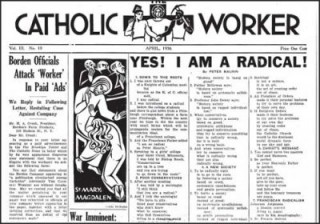May 2, 2014
Celebrating May Day and the birth of the Catholic Worker movement
by Claire Kelley

The Catholic Worker newspaper still costs 1 cent — the sameprice as it was on the date of the first publication, May 1, 1933.
May first, or May Day, the international worker day, is also the anniversary of the birth of the Catholic Worker Movement. In the midst of the Great Depression in 1933, a group of people including Dorothy Day, the Catholic journalist and activist, published their first newspaper with a print run of twenty five hundred copies and sold them in Union Square for a penny each. Their mission was a kind of utopianism— a desire to counter balance materialism, economic determinism, and violence in society with radical love for one’s neighbor and community.
And 81 years later, not much has changed. You can still buy the paper for the fee of a penny for each issue, and a year’s subscription costs 25 cents (although donations are accepted). Members of the Catholic Worker still hand out copies of the paper in Union Square on May Day each year. There are now 227 Catholic Worker communities around the world that are dedicated to nonviolence, voluntary poverty, prayer, and hospitality for the homeless. And members of the movement still protest and are often arrested for fighting against war and injustice.
But 128 years after the strike in Haymarket Square in Chicago in 1886 where protesters were killed, May Day has taken on a different form in our culture. As Nathan Schneider wrote yesterday for Al Jazeera:
Replacing May Day with Labor Day was part of a decades-long effort to stifle the vibrancy of populist movements… As inequality widens and our democracy weakens, we are losing the spirit of May Day, and suffering the consequences.
May Day is a reminder of the struggle for the dignity of the worker and the fight for a living wage for all.
Claire Kelley is the Director of Library and Academic Marketing at Melville House.